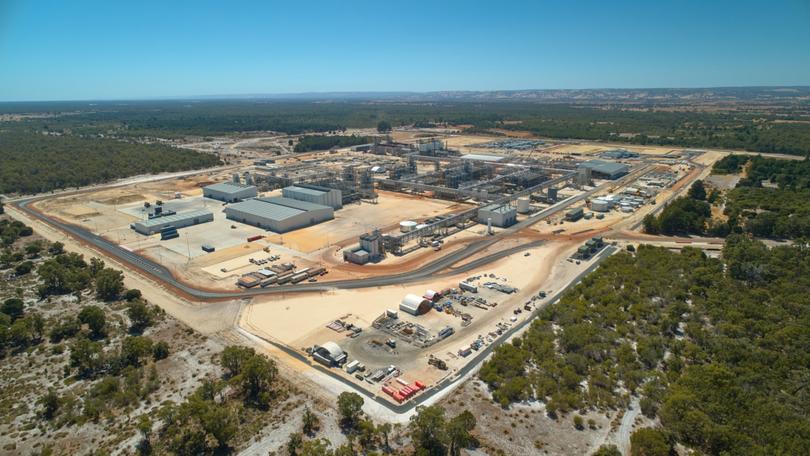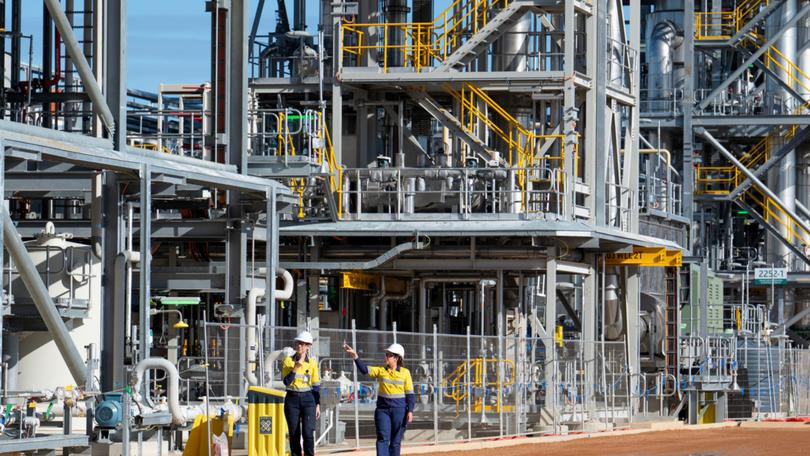Hundreds of jobs axed, up to $1.7b in asset revenue zapped as lithium giant Albemarle shuts part of WA plant
Some 300 Aussies are set to lose their jobs after a major lithium processor announced it was shutting its huge plant in Western Australia.

Albemarle will shut down a large chunk of its huge Kemerton lithium hydroxide processing plant in WA’s South West and has signalled that depressed lithium prices are here to stay for a while.
The US-headquartered lithium goliath says it will stop construction of the third production train at the Kemerton plant, located near Bunbury, while also placing the second train into care and maintenance.
Albemarle is instead turning its attention towards optimising output from the first train.
Sign up to The Nightly's newsletters.
Get the first look at the digital newspaper, curated daily stories and breaking headlines delivered to your inbox.
By continuing you agree to our Terms and Privacy Policy.The West Australian understands the move will lead to about 300 redundancies. Albemarle is set to retain around 460 people at Kemerton.
Albemarle will also book an impairment on the asset of between $US900 million and $US1.1 billion ($1.4b and $1.7b). It had already written off $US215m ($330m) from Kemerton’s value earlier this year.
Trains 1 and 2 at the Kemerton plant were completed in 2022 at a cost “well north” of $US1.5b, Mineral Resources boss Chris Ellison has claimed. The original budget for the project was $US1.2b.
Each Kemerton train has an annual production capacity of 25,000 tonnes of lithium hydroxide.
In June South West MLC and shadow energy and industrial relations minister Steve Thomas said the Kemerton Industrial Park, which revolves around the Kemerton lithium plant, was in dire need of additional government funding.
An Albemarle spokesman said Thursday’s announcement had “nothing to do” with State and Federal government policies.
“Today’s decisions regarding Kemerton are entirely due to market conditions and the commercial realities that lithium prices will stay lower for longer,” he said.
This ominous statement comes just a day after Liontown Resources cranked out first spodumene concentrate from Kathleen Valley, which is set to be Australia’s last lithium mine for the forseeable future.
Albemarle made a $6.6 billion takeover bid for Liontown last year, which was thwarted by Gina Rinehart.

Federal Resources Minister Madeleine King said market concentration and volatility in demand has caused “extreme price changes in lithium markets”, including an 80 per cent fall in lithium hydroxide prices over the last 12 months.
“This is complex problem, and it is impacting international markets across the critical minerals sector globally,” she said.
“The decision by Albemarle to downgrade its lithium hydroxide processing operations in Western Australia underlines the continuing volatility of international critical minerals markets.
“Current conditions in lithium markets highlight the importance of policy support for Australia’s critical minerals sector to help address distortions in global markets.”
Ms King reiterated the importance of Federal Labor’s 10 per cent critical minerals production tax incentive, valued at $17.6 billion over 14 years, to drive more “value-adding” of critical minerals onshore in Australia.
Kemerton is one of the downstream mining operations that would stand to benefit from the tax credit, which is set to kick in from mid-2027.
Most of the world’s lithium hydroxide plants are based in China. The Middle Kingdom has been accused of distorting or rigging various critical mineral commodity markets — notably for rare earth elements and nickel.
Albemarle in January announced it would wind down progress on bringing a fourth train at Kemerton to life. The company at the time said it would focus on completing “commissioning activities” for trains 1 and 2 at the downstream lithium processing plant and focus on constructing train 3.
The axe swung on about 150 construction jobs following the train 4 freeze.
Albemarle, which has an office on St Georges Terrace, is now escalating its global belt tightening initiative as the earnings squeeze from a weak lithium market grows.
The company slumped to a $US188m ($287m) loss for the June quarter.

Albemarle chief Kent Masters said the “immediate footprint actions” at Kemerton will “maintain Albemarle’s competitive position and ensure we execute with agility today and in the future”.
Albemarle holds a 49 per cent stake in the Talison joint venture that controls Australia’s largest lithium mine – Greenbushes — in the State’s South West near Bridgetown. Tianqi and IGO control the remaining 51 per cent.
Tianqi and IGO in Kwinana own WA’s other lithium hydroxide plant, which like Kemerton has been plagued by significant technical issues.
Albemarle also has a 50/50 joint venture with Mineral Resources at the Wodgina lithium mine 120km south of Port Hedland in the Pilbara.
Originally published on The Nightly
